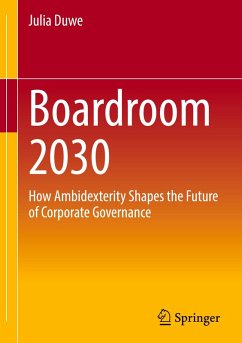
Ambidextrous Leadership
How leaders unlock innovation through ambidexterity

PAYBACK Punkte
0 °P sammeln!
This book prepares leaders for fundamental change processes of organizations. In times of radical changes and unplanned crises, ambidexterity has become a key competence of global companies. Ambidextrous organizations manage to improve their core business, while at the same time opening up new business fields for the future. To unlock innovation next to the running business, it is essential for leaders to be ambidextrous. How these balanced leaders can operate with two different styles is demonstrated in numerous practical examples and tips for successful implementation. The book illustrates h...
This book prepares leaders for fundamental change processes of organizations. In times of radical changes and unplanned crises, ambidexterity has become a key competence of global companies. Ambidextrous organizations manage to improve their core business, while at the same time opening up new business fields for the future. To unlock innovation next to the running business, it is essential for leaders to be ambidextrous. How these balanced leaders can operate with two different styles is demonstrated in numerous practical examples and tips for successful implementation. The book illustrates how the trade-off can be turned into an elegant balancing act.
Learn how to become an ambidextrous leader in this standard work on ambidexterity and leadership.
· Ambidexterity as a leadership approach for the digital transformation· Consciously shaping the digital change process· Enabling leaps in innovation· Driving evolution and revolution simultaneously· The relevance of ambidextrous leadership in times of crisis
The book provides easy-to-implement courses of action for executives to consciously and actively shape change, to inspire people in companies to release their creative potential and to make the leap into the future as an organization. The book also addresses the consequences of the COVID-19 pandemic on crisis management. It documents how ambidextrous leadership skills are becoming a key competence in times of crisis.
Learn how to become an ambidextrous leader in this standard work on ambidexterity and leadership.
· Ambidexterity as a leadership approach for the digital transformation· Consciously shaping the digital change process· Enabling leaps in innovation· Driving evolution and revolution simultaneously· The relevance of ambidextrous leadership in times of crisis
The book provides easy-to-implement courses of action for executives to consciously and actively shape change, to inspire people in companies to release their creative potential and to make the leap into the future as an organization. The book also addresses the consequences of the COVID-19 pandemic on crisis management. It documents how ambidextrous leadership skills are becoming a key competence in times of crisis.














